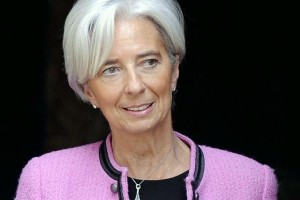Global migration an economic boon for all, World Bank says

International Monetary Fund (IMF) Managing Director, Christine Lagarde. Image courtesy of The Times.
Rich nations should prepare for continued levels of mass migration like those currently being experienced in Europe, according to a report by the World Bank and International Monetary Fund. But, migration could be the key to global economic growth, the report says.
Inequality will continue to drive migrants toward developed states, the report says, but points out these flows have the potential to reverse demographic imbalances, boost prosperity and ultimately end extreme poverty.
These are the findings of the ‘Development Goals in an Era of Demographic Change’ report, released in Peru at the start of the annual meetings of the World Bank and the IMF.
While developed countries face shrinking and aging populations, low-income states aren’t able to provide enough quality work for their own working-age citizens, who can be held back further by regional conflict and state fragility, the report said.
With about 74% of international migrants between the ages of 20 to 64 according to United Nations and official European statistics, freer cross-border migration can help stabilize economies across the globe, the World Bank/IMF report said.
World Bank Group President Jim Yong Kim said migration flows could potentially be an economic boon to all.
“If countries with aging populations can create a path for refugees and migrants to participate in the economy, everyone benefits,” he said.
“Most of the evidence suggests that migrants will work hard and contribute more in taxes than they consume in social services.
“With the right set of policies, this era of demographic change can be an engine of economic growth,” Mr Kim said.
Global economic growth projections by the World Bank and IMF now suggest a drop from 3.4% in 2014 to 3.1% growth this year — though an increase in the rate of growth to 3.6% is expected in 2016.
Low-income states, where more than 90% of global poverty is concentrated, should be implementing policies that improve education, health care and lower fertility rates, the report recommend.
Developed countries like the US and UK, meanwhile, should open themselves to higher levels of international trade, investment and migration, but also implement policies that strengthen social safety nets and welfare systems, the report says.
But it may take more than talk of long-term economic benefits to convince those countries to open up their borders.
Leaders across Europe are still torn on plans to redistribute hundreds of thousands of people fleeing countries across Africa and the Middle East, war-torn Syria and areas attacked by radical Islamic State militants.
In a speech at the Conservative Party conference, U.K. Interior Minister Theresa May lambasted mass migration levels, which she said would put too much strain on public services and jobs.
Ms May said the economic benefit would be “close to zero.”
“When immigration is too high, when the pace of change is too fast, it’s impossible to build a cohesive society,” she said.
However, IMF Managing Director Christine Lagarde said the migration debate had a long way to run and would remain a hot political issue for some time to come.
“The demographic developments… will pose fundamental challenges for policymakers across the world in the years ahead,” Ms Lagarde said.
“These issues will be at the centre of national policy debates and of the international dialogue on how best to cooperate in handling these pressures.”
Laurie Nowell
AMES Australia Senior Journalist












